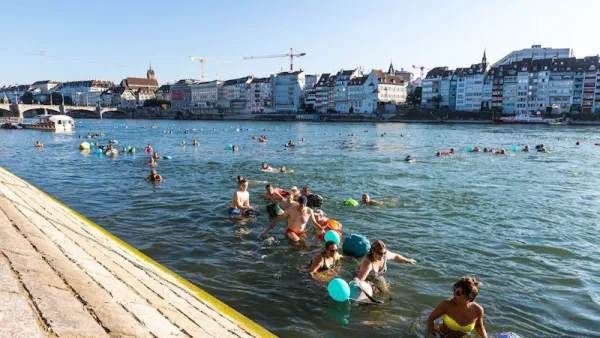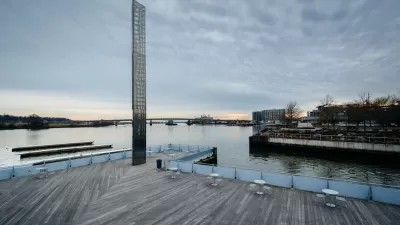The U.S. Army Corps of Engineers could soon study how to legalize swimming in the rivers around the nation’s capital—a scenario that would have seemed impossible in the not-too-distant past.

According to an article by Jacob Fenston, “someday in the not-too-distant future, going for a swim in the District’s rivers could be a real option on a hot summer day.”
“In the latest step toward making swimming in the city possible, the U.S. Army Corps of Engineers will conduct a feasibility study, identifying areas on the Potomac and Anacostia rivers where it’s clean enough and safe enough to swim,” according to Fenston. The study is contingent on President Joe Biden signing the Congress-approved 2022 Water Resources Defense Act.
The possibility of the Potomac and Anacostia rivers being clean enough for swimming first made the Planetizen newsfeed in 2018, when the grades for water quality, granted by local advocates, first crossed into passing territory for both rivers. At the time, the Potomac River’s grade was a B, and the Anacostia a D-. In 2020, the most recent grade for the Potomac River, the grade had slipped slightly to a B-. Unfortunately, the grade for the Anacostia had slipped back into fail territory. So, the efforts of the Army Corps of Engineers will be a welcome addition to the clean up effort.
The Potomac Riverkeepers launched a campaign earlier this year, documented in another article by Fenston, to legalize swimming in the Potomac River for the first time in 50 years.
Local advocates note that people are already going in the water around D.C., but formal legalization would help clear the way for recreational locations devoted to swimming.
FULL STORY: Splash! Army Engineers To Study Possible Swimming Beaches On D.C.’s Rivers

Planetizen Federal Action Tracker
A weekly monitor of how Trump’s orders and actions are impacting planners and planning in America.

Maui's Vacation Rental Debate Turns Ugly
Verbal attacks, misinformation campaigns and fistfights plague a high-stakes debate to convert thousands of vacation rentals into long-term housing.

Restaurant Patios Were a Pandemic Win — Why Were They so Hard to Keep?
Social distancing requirements and changes in travel patterns prompted cities to pilot new uses for street and sidewalk space. Then it got complicated.

In California Battle of Housing vs. Environment, Housing Just Won
A new state law significantly limits the power of CEQA, an environmental review law that served as a powerful tool for blocking new development.

Boulder Eliminates Parking Minimums Citywide
Officials estimate the cost of building a single underground parking space at up to $100,000.

Orange County, Florida Adopts Largest US “Sprawl Repair” Code
The ‘Orange Code’ seeks to rectify decades of sprawl-inducing, car-oriented development.
Urban Design for Planners 1: Software Tools
This six-course series explores essential urban design concepts using open source software and equips planners with the tools they need to participate fully in the urban design process.
Planning for Universal Design
Learn the tools for implementing Universal Design in planning regulations.
Heyer Gruel & Associates PA
JM Goldson LLC
Custer County Colorado
City of Camden Redevelopment Agency
City of Astoria
Transportation Research & Education Center (TREC) at Portland State University
Jefferson Parish Government
Camden Redevelopment Agency
City of Claremont





























